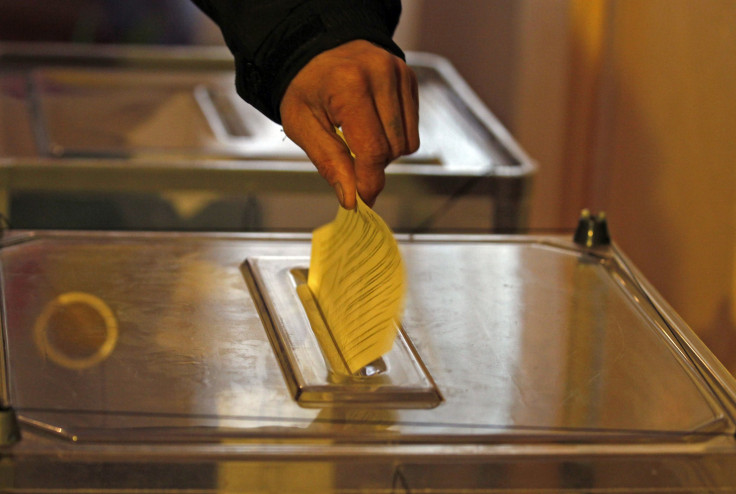Crimean Referendum: Overwhelming Expectation Crimeans Will Vote To Join Russia, West and Kiev Call It Illegitimate [UPDATES]

UPDATE 2:44 EST: Russia and Ukraine have agreed to hold a truce until March 21. Ukraine's acting Defense Minister says "no measures will be taken against our military facilities during that time. Our military sites are therefore proceeding with a replenishment of reserves."
Ukrainian soldiers will now get much-needed supplies, as they have been barricated in their bases since Russia occupied Crimea in late February. Whether or not they will be forced out of Crimea after the truce ends will be seen on Friday. Crimea's deputy Prime Minister says Ukrainian troops will be allowed to leave peacefully, and he expects eastern Ukraine to demand they join Russia next.
ORIGINAL STORY:
As the Crimean referendum to rejoin Russia goes on as planned today, Western authorities have condemned it, deeming it “illegal and illegitimate.”
One BBC reporter says that all of the voters he talked to voted in favor of Crimea joining as part of the Russian Federation.
The ballot has two questions: "Are you in favour of the reunification of Crimea with Russia as a part of the Russian Federation?" and “are you in favour of restoring the 1992 Constitution and the status of Crimea as a part of Ukraine?"
Neither option would allow Crimea to remain as it is now. The 1992 Crimean Constitution would declare Crimea a far more independent body. It was drafted and proposed while Ukraine as a whole was reforming itself after its break with the Soviet Union. Regardless of the referendum results, the Crimean Parliament already declared itself independent of Ukraine, although Ukraine and many in the West don't recognize this either. If the referendum votes in favor of joining Russia, the Parliament will request Russia annex it.
Many minority groups like the Crimean Tatars and ethnic Ukrainians are boycotting the referendum, calling it a fraud. The Ukrainian government too says it is illegitimate and will not recognize its outcome.
Pro-Russian supporters have been marching in cities across Crimea and in other parts of eastern Ukraine, where strong pro-Russia sentiment prevails. Huge crowds in Donetsk, an eastern Ukrainian city, chant their support for Russia.
Many marchers in Donetsk want Russian to be their official language, to have closer economic ties with Moscow and for Ukraine to stay away from NATO. The intense pro-Russian stance in eastern Ukraine show how sharply divided Ukraine is between the East and West. As strongly as many of the Euromaidan protesters feel about moving closer to the West, just as many in the East feel the same about cozying up to Moscow.
Russian officials have not explicitly said what they would do if the referendum vote comes out in favor of joining the Russian Federation, which is a virtual certainty. President Vladimir Putin stressed to German Prime Minister Angela Merkel that Russia will “respect the Crimean people’s choice.” Putin told Merkel that the Crimean people have the right to self-determination in accordance with the U.N. Charter.
Russian Foreign Minister Sergei Lavrov met with U.S. Secretary of State John Kerry and agreed to look for a solution to the Ukrainian situation via constitutional reforms. Lavrov again insisted that the Ukrainian government needs to “end the mass lawlessness and violence against the Russian-speaking population, our compatriots and all Ukrainian citizens being persecuted for dissent,” despite there being little evidence of ethnic Russians being persecuted.
Despite continued disagreements, the Kerry-Lavrov agreement to seek solutions through reform marks a significant step in East-West negotiations over Ukraine. CBS News State correspondent Margaret Brennan called it "the first time we've seen any sign of diplomatic give on the part of Russia," but cautioned it didn't mean a deal was set.
Results are expected in the hours after the polls close tonight. Ukraine is in the Eastern European time zone, two hours ahead of Greenwich Mean Time. It is six hours ahead of Eastern Standard Time. We will update with referendum results and reactions in and outside of Ukraine.
© Copyright IBTimes 2024. All rights reserved.












